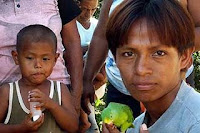“They violated one of the basic principals of the Olympic Games. That politics play no part whatsoever in them.”
With all due respect to the late Brundage, that statement is BS. For better or worse, politics and the Olympics are intertwined; whether it is the aforementioned Munich massacre, the Cold War boycotts in 1980 and 1984 or the current controversy over the Beijing games.
The 1968 Summer Olympics in Mexico City were no exception to the connection between the Games and politics. The most famous image of those Games was the Black Power salute given on the medal podium by African-American sprinters Tommie Smith and John Carlos. On the eve of the Olympics, the heavy hand of Mexican authorities led to the Tlatelolco massacre which killed an estimated 200-300 protestors along with the illegal detention of hundreds during the Games:
In 1968, the Mexican regime was in the 40-year-grip of the Institutional Revolutionary Party (PRI) despite elections. It wanted to make a good impression with the Olympics.
'The whole world would have its eyes on Mexico, but behind the screen of Olympic buildings there would remain extreme poverty, the stratification of a society that was hostile to those usually forgotten, the cruelty of a government willing to pretend anything,' said Mexican author and journalist Elena Poniatowska.
With the focus on Beijing, some Mexicans have referred to the Tlatelolco massacre as “Mexico's Tiananmen Square.” October 2, 1968 turned out to be a dark day for both Mexican and Olympic history as this video by Deborah Bonello for the Los Angeles Times demonstrates:
Sources- current.com, Monsters & Critics, thinkexist, The Latin Americanist, Wikipedia, Google Video, chicagotribune.com, MexicoReporter.com
